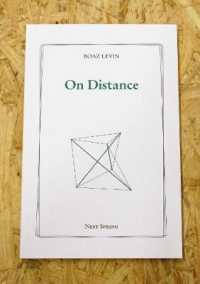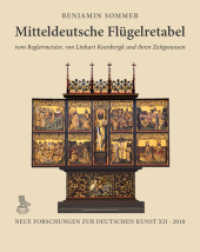- ホーム
- > 洋書
- > 英文書
- > Philosophy
Full Description
Inherent Human Dignity explores the philosophical and existential foundations of what it means to be human.
Inherent Human Dignity is a philosophical meditation and defense of the value of being human. Glenn Hughes explores the existential foundations of these concepts in this structured and accessible study about the experience of being human.
Hughes locates human dignity within the philosophical, political, and historical horizons of human culture. Guided by Eric Voegelin and Bernard Lonergan, literary and artistic examples, key moments of our modern era, and his own scholarship on the religions of the world, Hughes unfolds and accounts for human dignity's place in our world. He additionally utilizes key moments of our modern era to frame our understanding of human dignity, paying close attention to the Universal Declaration of Human Rights that was created by the United Nations following World War II. Ultimately, Hughes's meditation is concerned both with exploring the maximally differentiated set of insights into the meaning of being human and with articulating why the discovery of the inherent equal dignity of every person—without exception—is a profound and unique achievement.
Contents
Foreword
Preface
Part 1. Preliminaries
1. Honesty
2. Meaning & Value
3. The Cosmos
4. Belonging
5. The Desire to Know
6. Myth
7. The World of Space and Time
8. Science
9. Misunderstanding Human Nature
10. Constants of Human Nature
Part 2. The Idea of Inherent Human Dignity
11. Inherent Human Dignity
12. Inherent Dignity in the Universal Declaration of Human Rights (I)
13. Inherent Dignity in the Universal Declaration of Human Rights (II)
14. Persons, Rights, and Dignified Living
15. Digression: The Universal Search for Dignified Living
16. The Challenge of Respecting Inherent Dignity
17. Transcendent Mystery and Shakenness
18. Eclipsing Transcendent Mystery
19. Inherent Dignity as Both Concept and Mythic Symbol
20. The Refusal to Understand Inherent Dignity
21. Inherent Dignity and Ideaology
Epilogue: Love and Inherent Dignity
Bibliography








